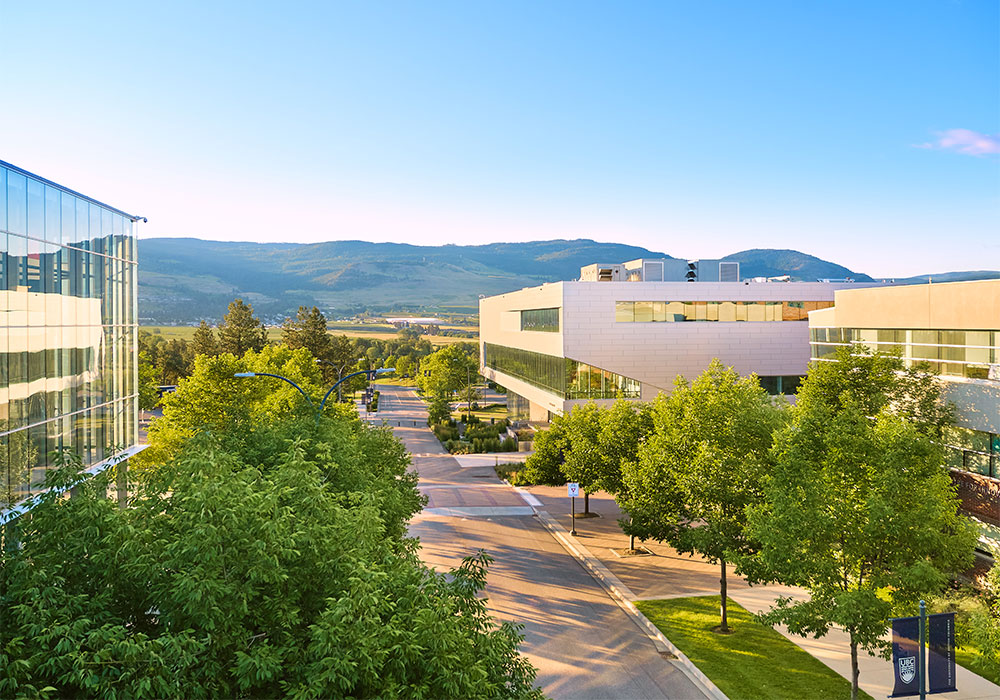Inaugural Campus as a Living Lab projects to focus on student mental health and sustainable infrastructure

While UBC Okanagan is home to a range of labs dedicated to everything from sensory ethnography to trace element analysis, two new research projects funded by the Office of Vice-Principal, Research and Innovation will use the campus itself as the laboratory.
The Campus as a Living Lab initiative, launched in late 2022, pairs UBCO researchers with campus operations staff to help design and implement innovative solutions to challenges on campus. Projects are meant to have immediate impact on campus but also be applicable to societal challenges in the Okanagan region and beyond.
This inaugural year saw two projects selected:
A joint effort by Dr. Lesley Lutes, Department of Psychology professor, and Dale Mullings, Associate Vice-President, Students, is aiming to improve mental health care for students via a new partnership between the Student Health Clinic and the UBCO Clinical Psychology Program. Students who visit the on-site Health Clinic will now be referred to the Psychology Clinic, where supervised student clinicians provide clinical psychology services.
Eventually, the project hopes to fully integrate psychologists on-site within the services offered by Student Health Clinic and act as a model in BC for integrating mental health services into primary health care.
“Research and practice from around the world show the importance of caring for the whole person. Integrating mental and behavioral health within primary care improves patient outcomes while also supporting our primary care medical teams,” says Dr. Lutes. “Thanks to the Campus as a Living Lab initiative, UBCO will be a leader in showing what psychologists integrated in a primary care network could look like in BC, starting right in our own backyard.”
The second project, led by Dr. Shahria Alam, Dr. Lisa Tobber and Dr. Andi Zahedi from the School of Engineering in collaboration with Andrew Lawson, Manager for the Construction Management Office, will aim to make the concrete structures on campus more sustainable and durable.
To assess current concrete conditions on campus, the team will extract cores from aging structures for analysis and develop rehabilitation techniques to extend the concrete’s life. The aim of the project is to develop an innovative, durable and sustainable concrete mix for repairs and new structures. This mix could reduce UBCO’s carbon footprint by using low-carbon materials and by making the concrete structures last longer, reducing emissions from repairs and new construction.
“Using the UBC Okanagan campus as our lab will allow this project to study real-world effects on concrete structures in the region and share those findings with local companies,” says Dr. Tobber. “Not only will UBCO benefit from sustainable concrete mixes in future construction, but we also hope this research will advance Canada’s plan to reach net-zero emissions by 2050.”
The project hopes these concrete mixes could extend the service life of current structures by 20 years and see newly built structures last more than 50 years.
“Here at UBC Okanagan, partnerships solve problems,” says Dr. Philip Barker, Vice-Principal and Associate Vice-President, Research and Innovation. “The Campus as a Living Lab initiative allows us to support activities that will use the campus as a test bed to try new approaches to benefit our University.”
Campus as a Living Lab project lead Dr. Miranda Hart was delighted to see the potential for real-world impact in both projects.
“Mental health and climate change are complex problems facing our society that have direct impacts on this campus,” says Dr. Hart. “We look forward to seeing how these unique partnerships between faculty and campus operations staff can create change not only for UBC Okanagan, but for our wider community.”